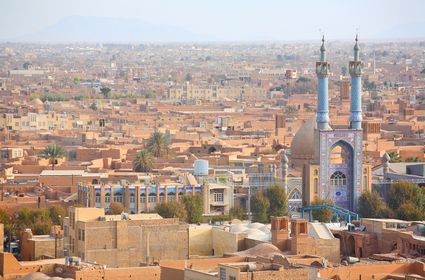Source: www.hra-news.org
Translation by Iran Press Watch

HRANA News Agency – Branch 11 of the Court of Appeals in Yazd Province has sentenced two Baha’i citizens of that city, Mehran Bandi Amirabadi and Mehran Islami Amirabadi, to a combined two years of discretionary imprisonment.
Based on a report by HRANA News Agency, the news arm of Human Rights Activists in Iran, on 12 January 2019 two Baha’i residents of Yazd, Mehran Bandi Amirabadi and Mehran Islami Amirabadi, were each sentenced to one-year discretionary imprisonment by Branch 11 of the Court of Appeals of Yazd Province.
Prior to this and after contesting a verdict by Branch 3 of the Court of Appeals, the Supreme Court had transferred this case to Branch 11 of Yazd Province’s Court of Appeals as an equal branch.
In a conversation with a HRANA reporter, a source close to these citizens said: “Considering the fact that the maximum sentence for the charge of “propaganda against the Regime” is one year, these citizens had previously been sentenced to one and a half times that, meaning eighteen months in prison, owing to the fact that the charge had been made more than once. In addition to this, one year of internal exile to the cities of Divandarreh and Saravan had been added to their sentences as supplementary punishment. Since the prior charge had been made in August of 2012 and it has been subjected to the statute of limitation, according to Article 137 of the Islamic Penal Code, the law of a repeated offence should not be applicable. Consequently, after an appeal to the Supreme Court and the transfer of the case to an equal branch, the verdict was reduced to one year of prison for each of these citizens. The supplementary punishment internal exile was also overturned.”
Based on Article 137 of the Islamic Penal Code: “If anyone who is sentenced to a level one to six discretionary punishment by a final judgement commits another level one to six offence from the date of final judgment prior to the restitution of reputation or prior to being subjected to the statute of limitation for completion of the punishment, he shall be sentenced to one and a half times the maximum punishment.”
According to this informed source, the punishment given to these Baha’is was not subject to the level one to six discretionary punishment classification; owing to this, the law of repeated offence should not have been enforced in the sentences issued against them.
Mehran Islami Amirabadi and Mehran Bandi Amirabadi had been moved to Yazd Prison in July/August of last year to serve their sentences. After appealing the verdict issued against them and the confirmation of the appeal by the Supreme Court, they were released temporarily until the completion of the hearing.
It should be mentioned that these two Baha’is together with five other Baha’is
were tried by Branch 3 of the Court of Appeals of Yazd Province in August last year, and according to the issued verdict, Mehran Islami Amirabadi was sentenced to eighteen months of prison and one year of internal exile to Saravan, and Mehran Bandi Amirabadi was sentenced to eighteen months of prison as well as one year of internal exile to Divandarreh.
In addition, five other citizens, Sorour Foroughi Mehdiabadi, Farzad Rahmani Manshadi, Ramin Hosouri Sharafabadi, Mohammad Ali Tadrisi and Ahmad Jafari Naeimi, were each sentenced to three years of suspended imprisonment by this court, and Ezzatollah Khorram, another defendant in this case, was exonerated from all charges.
Mr. Islami was arrested along with 19 other Baha’is on 31 July 2012 and charged with “propaganda against the Regime” and “propaganda in favor of groups and organizations against the Islamic Republic”. He was sentenced to one year of discretionary imprisonment and one year of suspended imprisonment.
Baha’is in Iran are deprived of freedoms because of their religious beliefs. This systematic deprivation occurs even though, according to Article 18 of the International Declaration of Human Rights and Article 18 of the International Covenant on Civil and Political Rights, “Everyone shall have the right to freedom of thought, conscience and religion. This right shall include freedom to have or to adopt a religion or belief of his choice, and freedom, either individually or in community with others and in public or private, to manifest his religion or belief in worship, observance, practice and teaching.”
According to unofficial sources, there are more than three hundred thousand Baha’is in Iran. However, the Iranian Constitution only recognizes Islam, Christianity, Judaism and Zoroastrianism, and does not recognize the Baha’i Faith as a religion. For this reason, the rights of Baha’is have been systematically violated for the last several years.
Leave a Reply